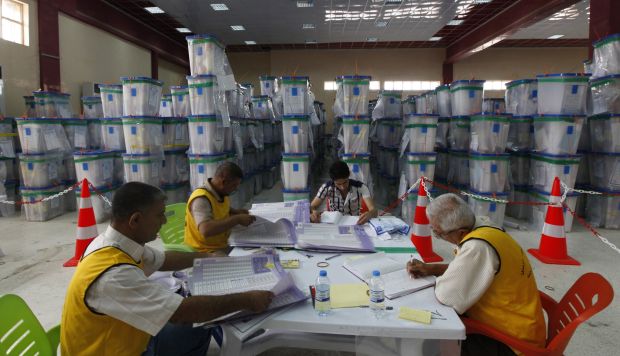
Employees from the Iraqi Independent High Electoral Commission count votes at an analysis centre in Baghdad on May 9, 2014. (Reuters/Ahmed Saad)
Baghdad, Asharq Al-Awsat—Iraq’s largest Shi’ite electoral bloc remained deadlocked over renewing Prime Minister Nuri Al-Maliki’s term in office, as early polling results suggested that his State of Law Coalition, a former member of the Shi’ite bloc, is on course to win the April 30 election.
The Iraqi National Iraqi Alliance, a major Shi’ite electoral bloc comprising the Islamic Supreme Council of Iraq (ISCI), the Sadrist Movement and other majority Shi’a political parties, played a pivotal role in backing Maliki’s premiership in 2010.
Both the Sadrist Movement and the ISCI were highly critical of the prime minister during his second term in office, particularly over his security record. They are now trying to block the coalition endorsing his premiership.
Speaking to Asharq Al-Awsat, Sadrist Al-Ahrar bloc spokesman Jawad Al-Jubouri said: “As an institution the National Iraqi Alliance is larger than any single figure,” adding that the broad electoral alliance is seeking to strengthen its status as a “national, non-partisan institution.”
Sadrist Movement leader Moqtada Al-Sadr fiercely criticized Maliki in the run up to the elections, calling him a “tyrant” and a “dictator” and saying he should not seek another term in office.
Jubouri said that the Alliance aims to choose its own candidate for the premiership “according to specific criteria and on the basis of talks with other political powers,” including the Sunni-majority Mutahidoun bloc, the Kurdistan Alliance and the secular Iraqiya List.
Earlier this week, Iraqi Prime Minister Nuri Al-Maliki rejected calls for the State of Law coalition to rejoin the Shi’ite electoral bloc, saying that his party would seek to form a “majority political government.”
In comments to Asharq Al-Awsat, State of Law coalition MP Sadiq Al-Labban reiterated Maliki’s claims that the coalition would seek to form a majority government. “The results will determine our position, but all signs indicate that the State of Law coalition and Maliki have likely secured victory.”
